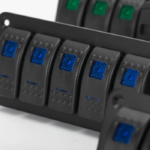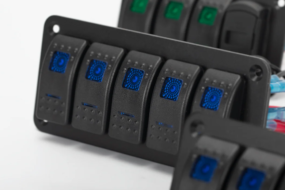
Wireless LED lights have revolutionized the way we illuminate our homes, workplaces, and outdoor spaces. These innovative lighting solutions offer a plethora of benefits, from energy efficiency to enhanced ambiance and convenience. Let’s delve into the world of wireless LED lights to understand their features, applications, and advantages.
Features of Wireless LED Lights
Energy Efficiency: LED lights are highly energy-efficient, consuming significantly less power than traditional incandescent bulbs. This efficiency is further enhanced in wireless LED lights due to their optimized design and advanced technology.
Wireless Connectivity: These lights operate without the need for physical connections like wires or cables. They can be controlled remotely using various technologies such as Bluetooth, Wi-Fi, or specialized lighting control systems.
Customizable Lighting: Wireless LED lights often come with adjustable brightness levels and color options, allowing users to create customized lighting scenarios according to their preferences and needs.
Long Lifespan: LED lights have a long operational life compared to conventional bulbs, reducing maintenance costs and the frequency of replacements.
Applications of Wireless LED Lights
Home Lighting: Wireless LED lights are popular for home lighting applications, offering versatility in terms of placement and control. They can be used for general illumination, accent lighting, or creating mood lighting in different rooms.
Outdoor and Landscape Lighting: From garden pathways to architectural highlights, wireless LED lights are ideal for outdoor and landscape lighting due to their weather-resistant designs and wireless connectivity options.
Commercial and Hospitality Spaces: Restaurants, hotels, and retail stores use wireless LED lights to enhance ambience, highlight products, and create immersive experiences for customers.
Event Lighting: Wireless LED lights are perfect for events such as weddings, parties, and concerts, where flexibility in lighting setups and color schemes is essential.
Advantages of Wireless LED Lights
Flexibility: The absence of wires allows for flexible placement and easy reconfiguration of lighting setups without the constraints of traditional wired systems.
Energy Savings: LED technology combined with wireless control helps in optimizing energy usage, leading to reduced electricity bills and environmental impact.
Remote Control: Users can conveniently control wireless LED lights using smartphones, tablets, or dedicated remotes, offering convenience and customization options.
Safety and Durability: LED lights generate less heat compared to traditional bulbs, reducing the risk of fire hazards. They are also durable and resistant to vibrations, making them suitable for various environments.
In conclusion, wireless LED lights represent a significant advancement in lighting technology, offering energy efficiency, flexibility, and enhanced control options. Whether for residential, commercial, or outdoor use, these lights continue to shape modern lighting solutions, providing both functional illumination and aesthetic appeal to spaces of all kinds.

















